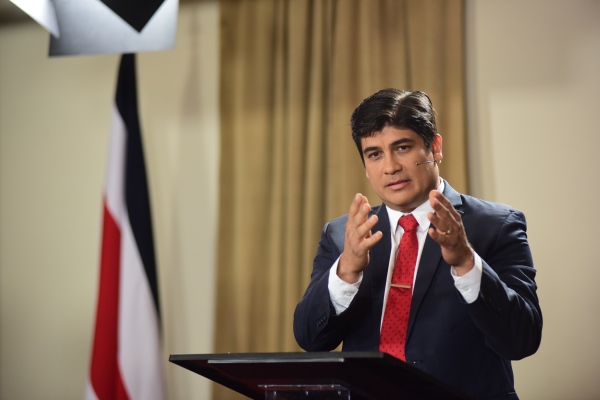By ICEFI and CLALS*

Carlos Alvarado Quesada, President of Costa Rica, April 2018/ Wikimedia Commons/ Public Domain/ https://es.wikipedia.org/wiki/Archivo:Carlos_Alvarado_Quesada_CAQ_PAC_03.jpg
The Costa Rican government’s draft budget for 2020, presented to the Legislative Assembly on August 30, reveals that shortfalls in tax revenues, high deficits, and accelerated public debt endangers the country’s ability to continue its social services and maintain its traditional level of democratic governability. The fiscal reforms that Costa Rica has undertaken – Law 9635 on Strengthening Public Finances – have proven, at best, insufficient to correct the imbalances envisioned in the new budget.
- The budget proposes a tax burden of 13.2 percent for 2020 – equal to that observed in 2018 before the tax reforms were implemented but below ICEFI’s estimate for the end of 2019 (13.5 percent). This rollback is alarming because it essentially erases the gains expected from the reforms. It is due to increased levels of tax evasion and avoidance, and illicit capital flows.
- The government projects public spending to reach 8,475.5 billion Colones (US$14.0 billion), accounting for 22 percent of GDP – slightly below the 22.1 percent approved for this year but higher than ICEFI’s estimate for the end of 2019 (20.9 percent). The 2020 proposal implies cuts to public spending that will affect key ministries, including Education and Public Works and Transportation, the budgets of which will decline 1.4 and 0.4 percent from this year, respectively.
Costa Rica’s fiscal deficit poses another long-term challenge. The draft budget contemplates a deficit that would reach 7.8 percent of GDP, higher than ICEFI’s estimate of 6.1 percent for 2019. For Costa Rica’s fragile public finances, this would suggest an inability to achieve fiscal sustainability in the medium term despite the recent tax reform.
- The proposed budget would grow national debt to 64.7 percent of GDP in 2020, which is double the debt level observed during the earlier years of the decade (29.9 percent).
The failure of the tax reform law underscores Costa Rica’s urgent need for a fiscal accord that responds to the challenges of economic growth, social development, and democratic governance. To avoid such a scenario, tax officials will have to devise and implement plans and strategies next year that will stop and reverse the steady loss of the Executive’s ability to collect taxes. The cuts to education, public works, and transportation could erode Costa Rican well-being. Public budgets reflect the priorities of a society, and both the Executive and Legislative authorities in San José have the obligation to expand debate to include input from affected sectors. Costa Rica will face even greater challenges if it fails to formulate a budget that includes a responsibly progressive tax regime; reduction in tax evasion and under-reporting; greater control over illicit capital flows, adoption of a principle of worldwide income; increase fiscal transparency and accountability, debt restructuring, and maintenance of spending levels that guarantee adequate universal services.
November 18, 2019
* The Instituto Centroamericano de Estudios Fiscales conducts in-depth research and analysis on the region’s economies. This is the first in a series of summaries of its analyses on Central American countries.
